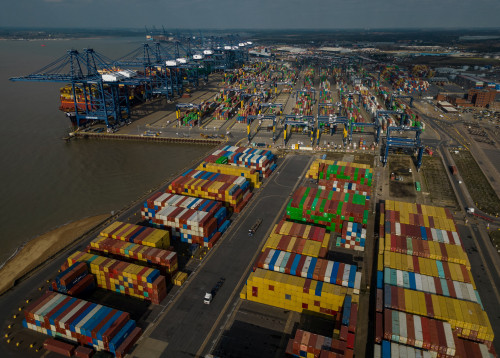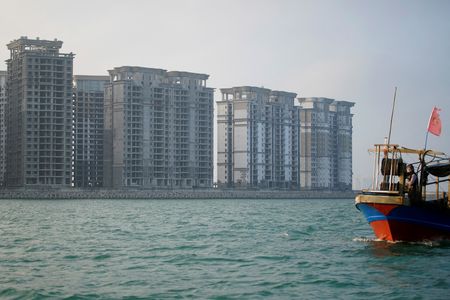 1
1 1
1

By Clare Jim and Xie Yu
HONG KONG (Reuters) -Chinese banks could face hefty writedowns in their mortgage businesses as growing numbers of homebuyers threaten to stop loan repayments to protest against unfinished apartments sold to them, analysts said.
The mortgage bad-loan ratios for banks could rise three- to five-fold as a result of homebuyers stopping mortgage payments, analysts estimate, adding the protests will significantly add to lenders’ risk exposure to the cash-starved property sector.
The protests further weaken the outlook for banks, which are already reeling under the impact of a slowing economy as the government asks them to provide supportive lending for firms hit by COVID-19 containment measures.
The homebuyers’ threats, mostly demanding government action by July or August deadlines, have deepened investor concerns about the property sector, which accounts for a quarter of the economy. Investors also worry about banks, which have been rattled in the past year by developers’ shortage of cash and many resulting defaults.
Chinese investors dumped banking and real estate stocks on Thursday, with the CSI300 Bank index falling as much as 3.3%.
Up to 1.5 trillion yuan ($220 billion) of mortgage loans are linked to unfinished residential projects in China, ANZ said in a report. That could be at risk if the homebuyers’ protest, mainly focused on central Chinese cities, widens.
Mortgages account for nearly 20% of all loans.
Some big-city projects are already affected.
Protests involved fewer than 20 developments at the beginning of this week but more than 100 by mid-week, according to media reports and analysts, who expect the number to reach 200 by the weekend.
Developers involved in these unfinished projects include cash-strapped China Evergrande Group and Sinic Holdings, according to analysts and media reports.
Evergrande declined to comment. Sinic did not immediately respond to request for comment.
‘PESSIMISTIC OUTLOOK’
Chinese authorities held emergency meetings with banks after becoming alarmed that an increasing number of homebuyers were refusing to pay mortgages on stalled projects, Bloomberg reported on Thursday, citing people familiar with the matter.
Several local governments had also met with homebuyers this week, analysts and local media said, without providing details.
“A primary concern is if this snub spreads too quickly and more home buyers follow suit only because their projects are going slowly, or simply out of a pessimistic outlook for the property sector,” said Shujin Chen, equity analyst at Jefferies.
Though banks own the pre-sold apartments as collateral, they would still likely suffer a loss, because the assets are uncompleted. Waiting for completion could expose the banks to a risk of a substantial drop in real estate values.
“It’s challenging to sell the apartments under current market conditions. Plus, if there comes a massive wave of home auctions, prices will crash,” said Xiaoxi Zhang, China finance analyst of Chinese research group Gavekal Dragonomics.
A fund manager also said banks would get zero equity back if they seized uncompleted assets.
“That’s going to wipe out half of the existing bank equity; it’s worst than subprime,” he said, referring to the US subprime mortgage crisis that began in 2007. The fund manager asked not to be named, due to the sensitivity of the matter.
BIGGEST EXPOSURES
The financial institutions with the biggest mortgage exposure are the four major state banks – Bank of China, Agricultural Bank of China, China Construction Bank and Industrial and Commercial Bank of China – plus Postal Savings Bank of China, China Merchants Bank and Industrial Bank, according to Jefferies.
Banks including Agricultural Bank of China, China Construction Bank, Industrial Bank and Postal Savings Bank of China said on Thursday their mortgage books tied to uncompleted or delayed home projects were relatively small and the risk was controllable.
Bank of China, Industrial and Commercial Bank of China and China Merchants did not immediately respond to requests from Reuters for comment.
Share market participants said authorities should intervene early to resolve the crisis, as distressed property developers would probably be unable to resume construction in the near term due to their liquidity crunch.
“Both social stability and financial stability will be endangered in the worst case,” Zhang of Gavekal Dragonomics said.
ANZ said authorities could step in to channel funds to ensure completion of unfinished projects, with banks and state-owned developers playing a role.
“Policy makers will need to send a clear and strong signal that they stand ready to be the “rescuer of the last resort” to rein in systemic risks,” said Morgan Stanley, adding that plausible moves included stronger demand stimulus and guarantees on quality developers.
($1 = 6.7332 Chinese yuan renminbi)
(Reporting by Clare Jim and Xie Yu; Additional reporting by Samuel Shen in Shanghai and Albee Zhang in Beijing; Editing by Sumeet Chatterjee and Bradley Perrett)